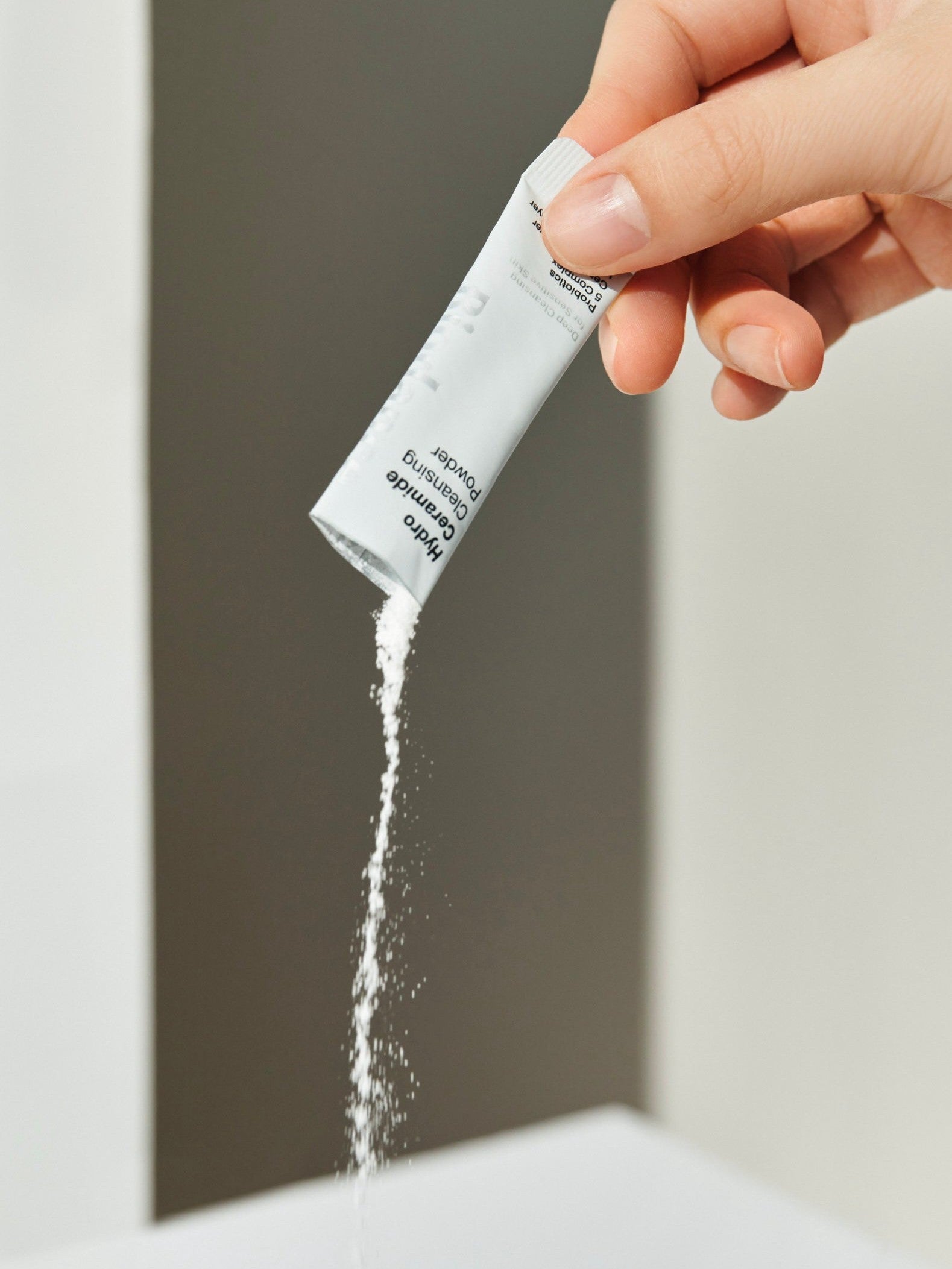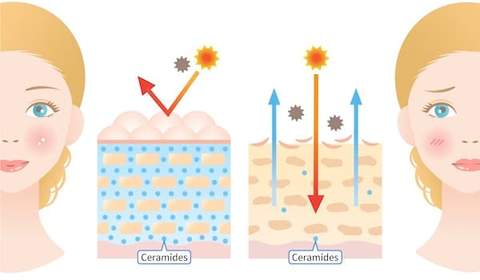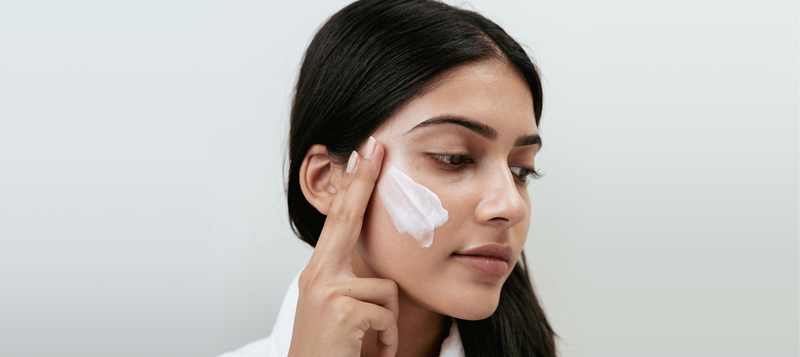Ceramides Benefits: Nourishing Skin & Strengthening Hair
What is Ceramide?
Ceramides - nature's guardian of skin and hair! These lipids, also known as fats, are vital to maintaining the health and beauty of both skin and hair. These wonder ingredients help to lock in moisture, keeping skin hydrated and preventing dryness, and shielding the skin and hair from environmental stressors like pollution and UV radiation. Acting as a natural barrier, ceramide products protect and repair the skin, helping it to function at its best. That's why they're a sought-after ingredient in skincare and hair care products, elevating the overall health and radiance of skin and hair.

The Facts About Ceramides
Ceramides make up about 50% of the skin’s lipids that help form your skin’s natural barrier to help keep vital moisture in and harmful irritants out.
When ceramides become depleted, the skin can become dull, dry, agitated, or cracked over time.
All skin types can benefit from including ceramide-containing products in their daily skincare routine—including oily, dry, normal, combination, and sensitive skin.

Ceramides for Skin: Benefits, Protection, and Hydrationkin
Here are some ceramide benefits in detail:
1. Hydration: Ceramides for face play a crucial role in maintaining hydration in the skin and hair. They help to retain moisture, preventing dryness and promoting softness. By incorporating ceramides into your skincare routine, you can improve the overall hydration of your skin, keeping it looking and feeling youthful, healthy, and hydrated.
2. Barrier Function: Ceramides for skin benefits include forming a protective layer on the skin, helping to prevent damage from environmental stressors such as pollution and UV radiation. This barrier function is crucial for maintaining the overall health and appearance of the skin. By incorporating ceramides into your skincare routine, you can help to strengthen the skin's natural barrier and protect it from damage.
3. Anti-Ageing: Ceramide cream benefits also include anti-ageing as they promote skin elasticity and firmness, reducing the appearance of fine lines and wrinkles. By replenishing ceramides in the skin, you can help to improve its overall elasticity and firmness, reducing the appearance of aging signs and promoting a youthful, radiant complexion.
4. Repair: Ceramides play a role in repairing damaged skin and hair, restoring its natural barrier function. When the skin's barrier function is damaged, it can lead to dryness, sensitivity, and premature aging. By incorporating ceramides into your skincare routine, you can help to promote the skin's natural repair process, restoring its barrier function and improving its overall health and appearance.
5. Nourishment: Ceramides for skin benefits also include providing nourishment to the skin and hair, improving its overall health and appearance. By replenishing ceramides in the skin and hair, you can provide it with the essential nutrients it needs to thrive, promoting a healthy, radiant complexion and silky, smooth hair. By incorporating ceramides into your skincare and hair care routine, you can promote overall skin and hair health, nourishing it from the inside out.

Ceramide Benefits For Hair
Since ceramides are an essential component of maintaining hair strength and structure, all hair types can benefit from the use of ceramides in hair products. However, those with dry, damaged or frizzy hair will find the use of ceramides particularly effective in improving the texture and appearance of hair. Continue reading as we illuminate the many advantages of using ceramides for scalp and hair health, including:
- Works to repair damage
- Helps strengthen the hair fibres
- Retains moisture in the scalp and hair
- Improves the look and feel of hair
1. Helps repair cuticle damage: There are a number of factors that can damage the hair and impact our natural ceramides, including bleaching and colour treating, UV exposure, continual use of heat styling tools, harsh hair care chemicals, or even over-washing. The cuticle is the outermost layer of the hair and comprises flat overlapping cells in a ‘scale-like’ fashion.5 Ceramides shield the cuticle with a protective layer but when the hair is damaged, we lose this natural protection and the cuticle scales become ‘lifted’. This leads to dryness, fizziness and breakage. By incorporating ceramides in hair products, we start to replenish this protective coating which then repairs hair strands and minimises breakage.
2. Strengthens the hair fibres: We know that ceramides for hair are incredibly nourishing to the cuticles - did you know that using ceramides also strengthens the overall hair shaft? When we deplete our ceramide barrier and cuticle scales start to lift, the inner structure of the hair fibre – the cortex –
becomes exposed to daily damage. The cortex contains keratin proteins and lipids5 which make up the structure of the hair and determine the strength and elasticity of your strands. When we use ceramides, we’re safeguarding the hair against external aggressors. This means we can reinforce the hair structure, fortify at the root, and reduce breakage - a leading cause of hair loss.
3. Hydrates the hair and scalp: In skincare, ceramides help reinforce your skin’s protective barrier and lock in moisture. If we think of the scalp in the same way, ceramides play an important function in keeping this area balanced; a disrupted scalp may trigger conditions such as dandruff. Using ceramides for hair supports our strands with a protective layer, helping to seal moisture in the cuticles and minimise transepidermal water loss from the hair cuticle.
4. Promotes shiny, smooth strands: Dullness is a common side effect of damaged hair. Dull hair lacks those natural, light-reflecting properties and has an overall lacklustre or frizzy appearance. Like we mentioned above, cuticle scales in damaged hair are lifted, however when using ceramides for hair repair, this eventually smooths out the cuticle scales again. The result is softer, smoother strands that naturally reflect light – bringing that glossy shine back to your hair.

Ceramides for Sensitive Skin: What to Know
Ceramides have the potential to be especially helpful for sensitive skin because of their capacity to improve the skin's barrier function and encourage moisture. However, since some formulations or ingredients may irritate, it is imperative to approach skincare for sensitive skin cautiously. Here are some important considerations when using ceramides for sensitive skin.
Choose Fragrance-Free Products: Fragrances often irritate sensitive skin. When choosing ceramide-containing products, look for fragrance-free formulations to reduce the risk of adverse reactions.
Look for Minimal Ingredient Lists: Products with few ingredients are less likely to irritate. Check the ingredient list and select products that are specifically designed for sensitive skin, preferably with few additives.
Avoid Harsh Ingredients: Some skincare ingredients, like preservatives, alcohol, and exfoliants, can be harsh and irritating. Choose ceramide products that exclude these potentially problematic ingredients.
Patch Test: Before using a new ceramide product on your entire face, perform a patch test on a small area of skin to check for any adverse reactions. This allows you to identify potential sensitivity before widespread use.
Consult with a Dermatologist: If you have sensitive skin or conditions like eczema or rosacea, consult a dermatologist before using new products. They can make personalised recommendations based on your skin's specific requirements.
Use Ceramides in Different Formulations: Ceramides are found in a variety of skincare products, including cleansers, moisturisers, serums, and sunscreen. Experiment with various product types to determine what works best for your skin without irritating.
Gradual Introduction: Introduce new ceramide products gradually into your routine. Begin by using it once or twice a week and monitoring how your skin responds before increasing the frequency.
Focus on Simple Skincare: Simplify your skincare routine by using gentle cleansers and minimalistic products. Overloading your skin with too many products can raise the risk of sensitivity.
Combine Ceramides With Other Soothing Ingredients: Ceramides can be used in conjunction with other calming agents, like chamomile or aloe vera, to help soothe sensitive skin and lessen inflammation.
Hydrate from Within: Apart from topical solutions, drinking lots of water and staying well-hydrated internally can help promote the health of your skin overall, especially sensitive skin.
Remember that everyone's skin reacts differently to skincare products, so pay attention to how yours does and adjust your routine accordingly. If you continue to experience irritation or discomfort, stop using the product and consult a skincare professional.

How to Incorporate Ceramides into Your Skincare Routine
Moisturisers:
Opt for moisturisers enriched with ceramides to provide long-lasting hydration and fortify the skin barrier. These moisturisers are particularly beneficial for individuals with dry or sensitive skin.
Serums:
Serums containing concentrated levels of ceramides can penetrate deeply into the skin, delivering intense hydration and nourishment to promote skin health and vitality.
Supplements:
In addition to topical application, consider incorporating ceramide-rich supplements into your routine to support your skin from the inside out.

In Conclusion
Ceramides are like the superheroes of skincare, keeping our skin strong, hydrated, and youthful. By using products with ceramides every day, you can give your skin the love and care it deserves, leading to a happier, healthier complexion. Research has shown that skin care products with anti-inflammatory and penetration-enhancing agents can improve the absorption of ceramides in your skin, relieve skin conditions, and restore healthy skin.
If you're interested in learning more about Ceramide powder or other natural plant extracts, don't hesitate to reach out to us at info@yanggebiotech.com. Our team of experts is always ready to provide you with more information and help you find the right ingredients for your needs.
References
1https://pubmed.ncbi.nlm.nih.gov/24656726
2https://www.ncbi.nlm.nih.gov/pmc/articles/PMC5504780/
3https://pubmed.ncbi.nlm.nih.gov/17587886/
4https://www.ncbi.nlm.nih.gov/pmc/articles/PMC7992683/
5https://www.ncbi.nlm.nih.gov/pmc/articles/PMC4201279/
Send Inquiry
Related Industry Knowledge
- Phycocyanin E18: The Future of Nutritional Supplements
- Unlocking the Power of Glutathione for Health
- Bacopa monnieri natural health.market in 2021 latest trends in the U.S.
- 9 Nuclear Radiation Natural Ingredients
- L Glutamine Powder for the Best Body
- Rosmarinic Acid: Nature's Potent Antioxidant with Powerful Health Benefits
- how to use chia seeds for weight loss
- hemp protein shake recipes for weight loss
- Explore the Nutritional Value of Butterfly Pea Powder
- 2024 Global Food Color Market Report- Trends, Forecast, And Competitive Analysis - YANGGEBIOTECH


